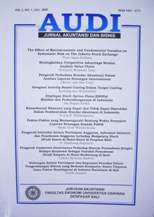PENGARUH INTENSITAS MORAL KONSENSUS SOSIAL, BESARAN KONSEKUENSI, DAN KEDEKATAN TERHADAP INTENSI KEPERILAKUAN DALAM SITUASI ETIS PENGGUNAAN SISTEM INFORMASI
Abstract
The importance of ethical issues related to IT has very critical in our society, along with this rapidly growth of IT lately. This paper investigates critical issues on ethical behavior, specifically the effects of moral intensity component, social consensus, magnitude of consequences and proximity to behavioral intention in situation-specific related to computerized information system ethics. The existence of this issue was triggered by swift change on organizational and the computer development.Data were collected using questionnaire based on two scenarios contain issues about ethics in computerization information system. Both scenarios are related to (1) user email privacy (1) hijacked software in unpaid licenses. Samples are 336 accounting student in university in Yogyakarta, that are 193 undergraduate students in accounting class, 99 post graduate students in accounting class, and 44 accounting profession students that have finished at least in business ethics, accounting information systems, and management information system class.Regression analysis with SPSS program was used to examine the hypothesis. This research suggests that individual moral intensity negatively affects behavioral intention in situation-specific related to computerize information system ethics for all scenarios.Downloads
Download data is not yet available.
How to Cite
KURNIA DEWI, NI WAYAN.
PENGARUH INTENSITAS MORAL KONSENSUS SOSIAL, BESARAN KONSEKUENSI, DAN KEDEKATAN TERHADAP INTENSI KEPERILAKUAN DALAM SITUASI ETIS PENGGUNAAN SISTEM INFORMASI.
Jurnal Ilmiah Akuntansi dan Bisnis, [S.l.], v. 3, n. 2, july 2008.
ISSN 2303-1018.
Available at: <https://ojs.unud.ac.id/index.php/jiab/article/view/2583>. Date accessed: 20 feb. 2026.
Issue
Section
Articles
Keywords
moral intensity, social consensus, magnitude of consequences, proximity, behavioral intention, computerized information system, regression analysis




















